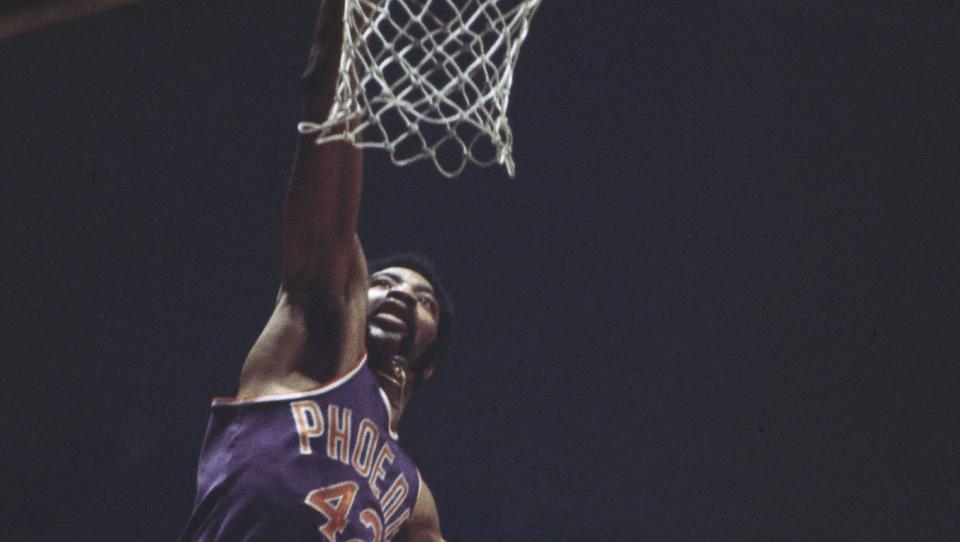Connie Hawkins, basketball's original high-flyer, dies at 75

Sometimes life is as much about the journey instead of the destination. That was never truer than it was for Connie Hawkins, who died Friday at the age of 75.
Every league or sports governing body has a stain on its legacy related to its treatment of an individual athlete. The NFL’s contemporary blackballing of Colin Kaepernick comes to mind. The stain on the NBA’s legacy during the 1960s was the treatment of Hawkins.
Born in Brooklyn on July 17, 1942, Hawkins’ hoops career can’t be reduced to only include his NBA glory years as the star 6-foot-8 forward for the expansion Phoenix Suns, or as Naismith Memorial Basketball Hall of Fame inductee 25 years ago. Hawkins’ most memorable exploits may have played out on the blacktops of Harlem and against competition in defunct professional basketball leagues.
Why? Because a large chunk of Hawkins’ NBA career was stolen from him after he was wrongfully banned for his loose association with Jack Molina, the notorious leader of a widespread point shaving scandal.
Hawkins was never directly implicated. That didn’t prevent him from being convicted in the court of public opinion. The University of Iowa expelled him before his freshman season and the NBA blackballed him for years before commissioner Walter Kennedy officially banned teams from signing him.
For the next eight years after his college expulsion, Hawkins endured a Homer’s Odyssey-like journey through the amateur basketball universe, touring with the Harlem Globetrotters, getting the best of NBA superstars during summer Rucker tournaments and in the American Basketball League.
“I try and conceive what it would have been like for me, at that age, to have my college years taken away, to be scorned as a crook, to be forced to go out and face life,” said longtime NBA player and coach Paul Silas, a former teammate of Hawkins on the Suns teams of the late ’60s and early ’70s. “I couldn’t have … but he did.”
It wasn’t until Hawkins climbed aboard the burgeoning ABA that the movement to vindicate him and clear his name picked up steam.
Hawkins signed with the Pittsburgh Pipers for his debut season and didn’t waste time leaving his mark, becoming the first MVP in the league’s history. During his only two seasons in the ABA, Hawkins averaged 28.2 points, 12.6 rebounds and 4.3 assists per game.
In 1969, LIFE Magazine writer David Wolf uncovered evidence that Hawkins was never involved in the gambling scandal. At that same time, Hawkins’ $6 million antitrust suit was a thorn in the league’s side. The league settled for $1.3 million (before inflation) and the NBA lifted its ban on Hawkins.
“I knew I was innocent,” Hawkins told the New York Times prior to his Hall of Fame induction, “and I never lost my confidence.”
In a strange way, the paucity of formal coaching during his years adrift may have molded Hawkins into a more unique figure. For seven seasons in the NBA, Hawkins averaged a more modest 16.5 points and eight rebounds per game, but his impact stretched beyond those statistics.
Rarely has a name been so fitting as Hawkins’. Jordan begat Kobe just as Dr. J begat MJ, but it was “The Hawk” who begat them all as an aerial swingman with an array of moves he utilized to get buckets.
Rest in Peace Connie Hawkins. Absolute magician with the ball. pic.twitter.com/mR17GPP3GU
— Hoopsrambler (@HoopsRambler) October 7, 2017
The brash playground component to his game was even apparent when he was stationary. For a 6-foot-8 forward, his ball-skills were unparalleled. It was his effortless palming of the ball that drove defenders insane and helped develop him into a cult hoops icon.
Now the best Connie Hawkins plays overall, not just dunks, are where he just swoops the ball around defenders endlessly pic.twitter.com/LK6ipRiT3Q
— Pro Hoops History (@ProHoopsHistory) October 7, 2017
Look around the NBA at slashing wing scorers and Hawkins’ influence is visible. Sadly, “The Hawk” has now ascended to a higher plane. However, his journey won’t be forgotten.



